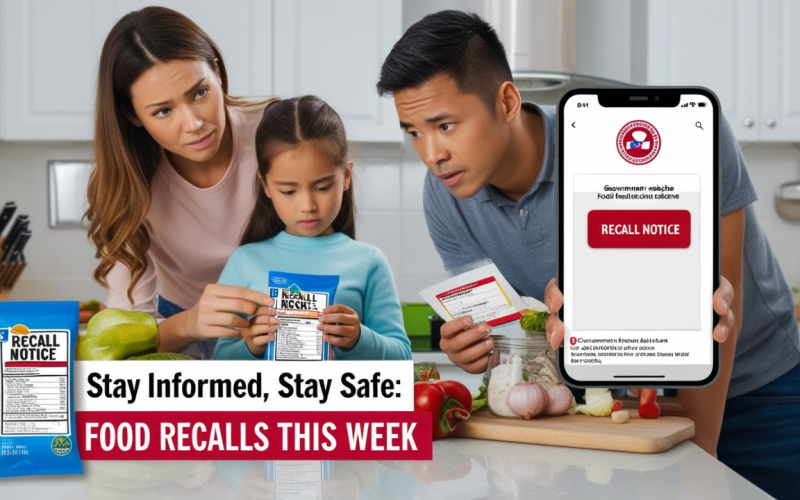Food Recalls This Week Canada,Food safety is essential for everyone. Knowing about food recalls helps you protect yourself and your family from potential health risks. Each week, various food products are recalled in Canada due to safety concerns. Staying informed ensures you make safe choices about what you eat.
In this article, I will guide you through the latest food recalls in Canada, how to identify recalled products, and the steps you should take if you have a recalled item. By the end, you’ll have the knowledge to keep your household safe and informed.
Key Takeaways
- Regularly checking food recalls helps you avoid unsafe products.
- Recalls occur due to contamination, mislabeling, or foreign objects in food.
- Reading labels and using official resources are crucial for identifying recalls.
- If you have a recalled product, stop using it and contact the manufacturer.
- Utilize government websites and reliable news sources to stay updated on recalls.
Understanding Food Recalls This Week Canada
What is a Food Recall?
A food recall is an action taken to remove a product from the market. This happens when a food item is found to be unsafe or mislabeled. The main goal is to prevent consumers from purchasing or consuming harmful products. Recalls can be initiated by manufacturers, retailers, or government agencies like Health Canada.
Reasons for Food Recalls
Food recalls can occur for several reasons:
Contamination: This is one of the most common reasons for recalls. Contamination can involve harmful bacteria like Salmonella or E. coli. These bacteria can cause serious illness, especially in vulnerable populations such as children, the elderly, and those with weakened immune systems.
Mislabeling: Sometimes, products are mislabeled, which can lead to consumers unknowingly consuming allergens or substances they need to avoid. For example, a product might be labelled as nut-free when it actually contains nuts, posing a risk to individuals with nut allergies.
Foreign Objects: Occasionally, foreign objects like glass, metal, or plastic pieces are found in food products. These can cause injury or pose choking hazards, especially in products intended for children.
Current Food Recalls in Canada This Week
Overview of Recent Recalls
This week, several food products have been recalled across Canada. These recalls are essential to ensure consumer safety and prevent potential health issues. The reasons for these recalls vary, but they all aim to protect the public from potential harm.
Detailed List of Recalled Products
Here are some of the major recalls announced this week:
Recent Food Recalls in Canada This Week
| Product Name | Reason for Recall | Affected Batch Numbers | Instructions |
|---|---|---|---|
| Fresh Farm Chicken | Salmonella Contamination | FF123, FF124 | Stop using and return for refund |
| Sweet Snack Cookies | Mislabeling (contains nuts) | SC456, SC457 | Dispose of product safely |
| Organic Juice Pack | Foreign Object (plastic piece) | OJ789, OJ790 | Do not consume and contact retailer |
Fresh Farm Chicken
This week, Fresh Farm Chicken has issued a recall due to Salmonella contamination. Salmonella can cause severe gastrointestinal issues, including diarrhoea, fever, and abdominal cramps. If you have purchased Fresh Farm Chicken with batch numbers FF123 or FF124, stop using it immediately and return it for a refund.
Sweet Snack Cookies
Sweet Snack Cookies are being recalled because they are mislabeled as nut-free. The presence of nuts poses a serious risk to individuals with nut allergies. If you have cookies with batch numbers SC456 or SC457, dispose of them safely to avoid any allergic reactions.
Organic Juice Pack
Organic Juice Pack has recalled some of its products due to the presence of plastic pieces. Consuming these can lead to choking or internal injuries. If your juice pack has batch numbers OJ789 or OJ790, do not consume it and contact the retailer for further instructions.
How to Identify Recalled Products
Reading Labels Carefully
Always check the labels on your food products. Look for:
Expiration Dates: Ensure products are within their use-by dates. Expired products are more likely to have gone bad or may have been recalled.
Batch Numbers: These numbers help identify if a specific batch is recalled. Batch numbers are usually found on the packaging and can help you determine if the product you have is part of the recall.
Ingredients List: Review the ingredients to ensure there are no allergens or substances you need to avoid. This is especially important if a product has been mislabeled.
Using Official Resources
Reliable information about recalls is available on government websites. Health Canada provides up-to-date recall information that you can trust. By regularly visiting these websites, you can stay informed about the latest recalls and take necessary actions promptly.
Steps to Take If You’ve Purchased a Recalled Item
| Step | Action |
|---|---|
| 1 | Stop using the product |
| 2 | Verify if your product is recalled |
| 3 | Contact the manufacturer |
| 4 | Report to health authorities |
Mobile Apps for Food Recalls
There are several mobile apps designed to keep you informed about the latest food recalls. These apps send alerts directly to your phone, making it easy to stay updated. Some recommended apps include FoodRecall Alert and Recall Monitor, available on both iOS and Android platforms.
Steps to Take if You’ve Purchased a Recalled Item
Stop Using the Product Immediately
If you suspect you have a recalled product, stop using it right away. Continuing to consume or use the product can pose health risks. For example, consuming contaminated chicken can lead to severe foodborne illnesses.
Check If You’re Affected
Verify if your product is part of the recall. Compare the batch numbers and other details with the information provided in the recall notice. This step is crucial to ensure that you are only discarding the affected products.
Contact the Manufacturer or Retailer
Reach out to the company that made or sold the product. They may offer a refund, replacement, or further instructions on what to do next. Contacting them promptly can help you resolve the issue quickly and safely.
Report to Health Authorities
Inform health authorities if you’ve consumed a recalled product and feel unwell. This helps them monitor the impact of the recall and take necessary actions. Reporting can also aid in preventing further health risks to others.
Preventing Future Exposure to Recalled Foods
Proper Food Storage Practices
Storing food correctly can minimize the risk of contamination. Keep perishable items refrigerated and follow storage instructions on labels. Proper storage not only helps in maintaining the quality of food but also reduces the chances of foodborne illnesses.
Regularly Updating Your Knowledge
Stay informed about the latest recalls by regularly checking official sources. Knowledge is your best defense against unsafe products. By being proactive, you can prevent potential health risks before they become a problem.
Educating Your Family
Ensure that everyone in your household knows how to handle food recalls. Teaching these practices helps maintain overall family health and safety. Educate your family about the importance of reading labels, checking batch numbers, and knowing the steps to take if a product is recalled.
Resources for Staying Updated on Food Recalls
Government Websites
Health Canada is the primary source for official recall information. Their website provides detailed and accurate updates on all food recalls in Canada. By visiting Health Canada’s website regularly, you can stay informed about the latest safety notices.
News Outlets
Reliable news sources like CBC News offer timely updates on food recalls. They often provide comprehensive coverage and additional insights, helping you understand the broader context of each recall.
Subscription Services
Signing up for recall alerts via email or SMS ensures you receive immediate notifications about new recalls. This proactive approach helps you stay ahead of potential issues, allowing you to act quickly to protect your health.
Resources for Food Recall Information
| Resource Type | Name | Website/App |
|---|---|---|
| Government Website | Health Canada | healthcanada.gc.ca |
| Mobile App | FoodRecall Alert | Available on iOS and Android |
| News Outlet | CBC News | cbc.ca/news |
Understanding the Impact of Food Recalls
Food recalls have a significant impact on both consumers and manufacturers. Understanding these impacts can help you appreciate the importance of recalls and how they contribute to public health.
Consumer Trust
Food recalls can affect consumer trust in brands and products. When a recall occurs, it can lead to a loss of confidence in the affected brand. However, prompt and transparent recalls can help maintain trust by showing that the company prioritizes safety.
Financial Implications for Manufacturers
Recalls can be costly for manufacturers. They may face financial losses due to refunds, replacements, and damage to their reputation. In some cases, recalls can lead to long-term changes in how companies manage quality control and safety protocols.
Public Health Benefits
Recalls play a crucial role in protecting public health. By removing unsafe products from the market, recalls prevent potential outbreaks of foodborne illnesses and other health issues. This proactive approach helps safeguard the community and promotes overall well-being.
How Technology is Enhancing Food Recall Processes
Advancements in technology are improving how food recalls are managed and communicated. These innovations make the recall process more efficient and effective.
Improved Tracking Systems
Modern tracking systems allow manufacturers to monitor their products more accurately. These systems can quickly identify affected batches and streamline the recall process, reducing the time it takes to notify consumers.
Enhanced Communication Channels
Technology has expanded the ways in which recalls are communicated to the public. Social media, mobile apps, and email alerts ensure that information about recalls reaches consumers quickly and efficiently. This rapid communication helps minimize the risk of exposure to unsafe products.
Data Analytics
Data analytics tools help identify patterns and trends in food safety issues. By analyzing data from recalls, authorities can pinpoint the root causes of problems and implement measures to prevent future occurrences. This proactive approach enhances overall food safety standards.
The Role of Consumers in Food Safety
Consumers play a vital role in maintaining food safety. By being vigilant and informed, you can contribute to a safer food environment for everyone.
Reporting Issues
If you encounter a problem with a food product, such as contamination or mislabeling, report it to the appropriate authorities. Your reports can help trigger recalls and prevent others from being affected.
Following Recall Instructions
When a recall is issued, follow the instructions provided carefully. Whether it involves disposing of a product or returning it for a refund, adhering to these guidelines ensures your safety and supports the effectiveness of the recall.
Staying Educated
Continuously educate yourself about food safety practices. Attend workshops, read informative articles, and stay updated on the latest guidelines from health authorities. An informed consumer is better equipped to make safe and healthy choices.
My Opinion
Staying informed about food recalls is essential for your safety and well-being. By regularly checking official sources, reading labels carefully, and knowing the steps to take if you encounter a recalled product, you can protect yourself and your loved ones from potential health risks.
Make food safety a priority and stay updated to ensure a healthy lifestyle. Remember, being proactive and informed is the best way to keep your household safe from unsafe food products.





